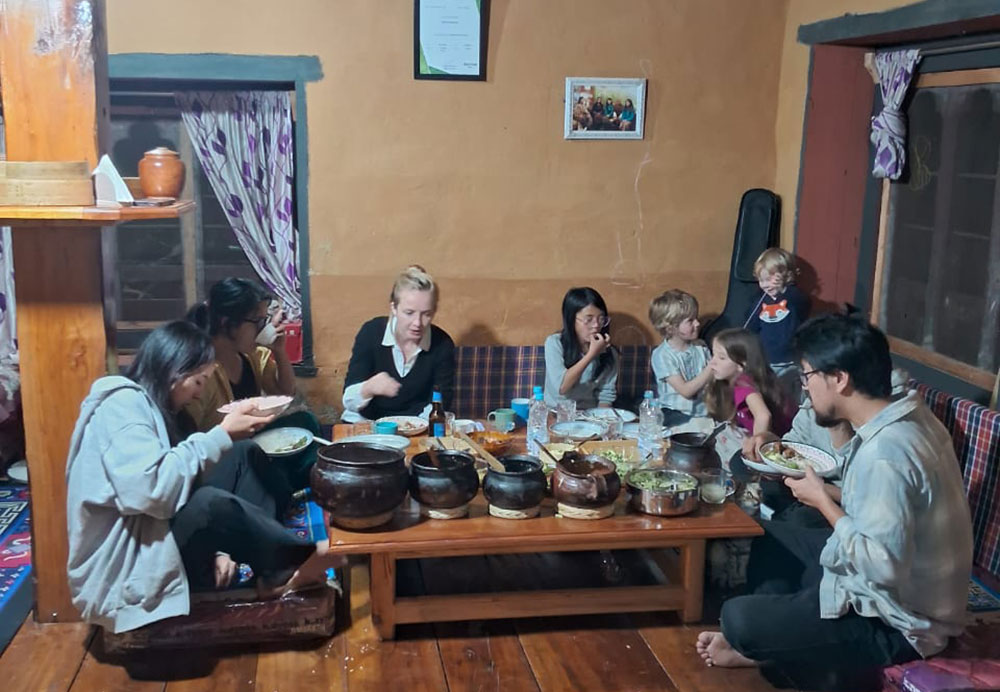Chencho Dema
In Punakha, homestays support local livelihoods and help conserve the endangered White-Bellied Heron (WBH). Located along the Phochhu, Mochhu, and Punatsangchhu rivers, they offer visitors a chance to experience local culture and learn about the heron’s threatened habitat.
Among these hosts is Kinley Dem, a 38-year-old owner of Damchi Homestay in Kabjisa, who credits the White-Bellied Heron (WBH) for inspiring her business. “If it weren’t for this bird, I might never have started the homestay, which now supports my family,” she said.
Kinley’s dedication to conservation shines through her regular walks along the Mochhu riverbank, hoping to spot the rare heron. She also raises awareness about the bird’s importance, sharing her message with guests, neighbors, and friends.
“Guests often ask what I do for the bird. I tell them I urge people to avoid logging near the riverbanks and keep the area clean to protect its habitat,” Kinley Dem said.
The Royal Society for Protection of Nature (RSPN) is leading efforts to protect Bhutan’s biodiversity, focusing on the White-Bellied Heron’s habitats along the Punatsangchhu and Mangdechhu basins. By incorporating community-based tourism (CBT), RSPN is raising conservation awareness and providing sustainable livelihood opportunities.
Khachi Wangmo, Project Officer of RSPN’s Sustainable Livelihood Division, emphasised the role of CBT in supporting long-term socio-economic well-being while conserving the environment.
“CBT is a key livelihood program that shows how conservation can drive sustained socio-economic benefits,” she said.
RSPN has supported the development of village homestays in six districts, including Punakha, Wangdue, and Tsirang, contributing to both environmental and cultural conservation. The project also works to diversify livelihoods, promote sustainable practices, and build resilience to climate change.
For Lotey Gyeltshen, a 58-year-old homestay operator in Tshekha, Dzomi Gewog, his journey into conservation began with a training program last year. Since then, he has hosted over 60 guests and made it a point to raise awareness about the White-Bellied Heron.
“I spotted a lone heron near my homestay last year, but I haven’t seen it since. I regularly visit the riverbank to check for sightings and update RSPN,” he said.
Aum Pem Zam, who opened her homestay in Dzomlingmithang this year, has hosted more than 50 guests in just a few months. Like her friends, she educates visitors on the importance of the White-Bellied Heron.
“I always share the story of this rare bird with my guests to ensure they understand its significance,” she said.
In Punakha, 21 homestays received grants of Nu 29,560 each develop as homestay, with agreements signed to ensure proper use of the funds. Of these, eight have been certified by the Department of Tourism.
RSPN will assess the remaining 13 homestays with technical support from the Department of Tourism next year.
The organisation continues to support these homestays through marketing efforts, including promotional videos and brochures, to attract more visitors.
According to The 2024 Annual Population Survey of the White-Bellied Heron, Bhutan is home to 25 WBH individuals, including three at the WBH Conservation Centre. With fewer than 60 WBH worldwide, Bhutan serves as a crucial sanctuary for the species, hosting more than 45 percent of the global population.
Through these homestays, visitors not only experience authentic Bhutanese hospitality but also contribute to the preservation of one of the world’s most endangered bird species, ensuring long-term protection for the WBH and its habitat.


